Just over five years ago, April 7, 2004, U.S. Supreme Court Associate Justice Antonin Scalia gave a speech at Presbyterian Christian High School in Hattiesburg, Miss. U.S. Deputy Marshal Melanie Rube, working the Southern District of Mississippi – Hattiesburg, forced Associated Press Writer Denise Grones, working out of the Jackson, Miss. bureau, and Hattiesburg American’s Reporter Antoinette Konz to erase their recordings of Scalia’s remarks.
The Reporters Committee for Freedom of the Press complained to Justice Scalia who wrote letters of apology to the reporters. He stated that the Marshal had misunderstood his personal policy regarding the press.
 Scalia’s personal policy is not based on a particular dislike of the press, but says he tries not to become part of the political process, that attaches to the other two branches of government; legislative and executive. He wishes to avoid being seen as news. Of course he is news; he is one of the nine most powerful people in the United States, through the judicial branch. What he says and thinks is of tremendous interest to the citizenry, whether he thinks it should go beyond his court writings, or not. Scalia rarely allows radio and television coverage of his events.
Scalia’s personal policy is not based on a particular dislike of the press, but says he tries not to become part of the political process, that attaches to the other two branches of government; legislative and executive. He wishes to avoid being seen as news. Of course he is news; he is one of the nine most powerful people in the United States, through the judicial branch. What he says and thinks is of tremendous interest to the citizenry, whether he thinks it should go beyond his court writings, or not. Scalia rarely allows radio and television coverage of his events.The paper and AP, on behalf of their reporters, sued the federal government and several months later the Justice Department admitted wrongdoing and settled for the demanded amount. One question was left to the court on injunctive relief.
Apparently Federal Marshal Rube does good work on the fugitive side, Only a year later she was the contact Deputy when a Mississippi Drug Kingpin, David Tyree Warner, AKA “Super Dave” or “Mississippi Dave” was added to U.S. Marshals 15 Most Wanted List. He was captured in Mexico with in three months.
She wasn’t held personally liable. Hopefully, her supervisor had a comment for her and that there was retraining or at least a memo clarifying the DOJ’s policy on obtaining evidence from the news media which is spelled out in section 9-13.400 News Media Subpoenas; Subpoenas for Telephone Toll Records of News Media; Interrogation, Arrest, or Criminal Charging of Members of the News Media.
So what’s wrong with this picture?
Here Come the Judge, Tue. April 14
 Justice Scalia came to the University of New Mexico and spoke to several law school classes. He gave a public presentation cosponsored by the Federalist Society and UNM School of Law in the afternoon. He was introduced by Law School Dean Leo Romero.
Justice Scalia came to the University of New Mexico and spoke to several law school classes. He gave a public presentation cosponsored by the Federalist Society and UNM School of Law in the afternoon. He was introduced by Law School Dean Leo Romero.Ground rules were set; reporters could record Scalia for note taking purposes only. Two photo opportunities were scheduled: the first and last two minutes of his speech.
Security existed, as equipment was checked by Albuquerque Police and the press was directed to a common area.
Police and U.S. Marshals were low-key; recorders were permitted, and two minutes after stepping to the podium the University’s press minder rounded up the photographers.
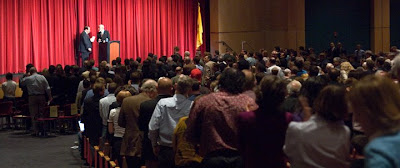 The last two-minute photo opportunity did not happen as the cue for it to begin, the Dean's announcement, became a thank you and Scalia left the stage.
The last two-minute photo opportunity did not happen as the cue for it to begin, the Dean's announcement, became a thank you and Scalia left the stage.President Ronald Reagan appointed Scalia to the Supreme Court in 1986, when William Rehnquist was elevated to Chief Justice upon the retirement of Warren E. Burger. He is now the second senior member of the court, behind John Paul Stevens.
Scalia spoke of being a believer in interpreting the Constitution through textualism and originalism, as opposed to the theory of a “Living Constitution.”
He is an eloquent and passionate speaker. In the absence of an opposing view, one could be swayed to believe him correct. I am not about to match wits with the man, though he is not my favorite judge. He claims to be a textual and original proponent, but doesn’t always practice it.
 Scalia made two unrelated points that struck me hard.
Scalia made two unrelated points that struck me hard.He talked about efforts to have the death penalty declared unconstitutional by the court. He calls it, “My court,” rather than the court upon which “I” sit.
Scalia spoke about the 14th Amendment's language “…nor shall any State deprive any person of life, liberty, or property, without due process of law….” He placed strong emphasis on “life” as meaning a government may take a life after due process, specifically meaning that the death penalty is Constitutional. Life and due process also appear in the Fifth Amendment.
 He attacked the living Constitution argument, that times change and the Constitution should change with the times. Scalia is concerned that the current court is at a 5-4 juncture where the swing of a single vote could render the death penalty unconstitutional. He said if that happened, “game over," it would be gone, never to return.
He attacked the living Constitution argument, that times change and the Constitution should change with the times. Scalia is concerned that the current court is at a 5-4 juncture where the swing of a single vote could render the death penalty unconstitutional. He said if that happened, “game over," it would be gone, never to return.That’s when I had a sudden urge for a drink. Peculiar, because I don’t drink, but more telling as thoughts of the 18th Amendment, prohibition and the 21st Amendment lifting prohibition ran through my mind.
From a practical matter, should Scalia’s court rule the plain language of the Constitution unconstitutional, eliminating death, nothing prohibits passage of a new Constitutional amendment imposing the death penalty again
New Mexico recently banned the death penalty in favor of sentences of life without the possibility of parole, without addressing the constitutionality of the question. Constitutionally it's still available, just not used.
The other point came in the question and answer period. A gentleman rose and asked an abortion related question. Why didn’t the Supreme Court consider abortion murder?
 Scalia obviously had been down this path before, as he stopped the man from giving a speech. He's heard many cases, be they called abortion rights, right to life, or reproductive health cases, during his tenure.
Scalia obviously had been down this path before, as he stopped the man from giving a speech. He's heard many cases, be they called abortion rights, right to life, or reproductive health cases, during his tenure.Scalia cited the 13th Amendment’s, “Neither Slavery nor involuntary servitude, except as a punishment for crime…” then went back to the Constitution’s, “three-fifths of all other Persons…” clause on how to determine Representatives and taxation; summing up that the drafters were talking about “walking around persons,” and did not intend it to mean that pregnant women got counted as two.
Contrary to the question from one of my anti-abortion friends; was Scalia pro abortion? No, not necessarily, he was just not going to count a fetus as a person using the Constitution’s way of counting.

The Tea Party, Wed. April 15
 I wasn’t invited, but that was how it was set up.
I wasn’t invited, but that was how it was set up.Liberal bloggers seemed intent on suggesting that the effort was a partisan effort organized by some FOX News commentator. I must not have been paying attention because if there was an underlying message, I missed it. Since then, I haven’t caught up.
I’ve covered a lot of demonstrations, marches, protests, and even a few riots; tea party day just didn’t mesh.
 I drove east on Montgomery Boulevard and there were a smattering of sign carriers, but the protetors seemed removed, maybe even oblivious to being in front of the Internal Revenue Service offices just east of San Mateo Boulevard. This was part of a small group at San Pedro.
I drove east on Montgomery Boulevard and there were a smattering of sign carriers, but the protetors seemed removed, maybe even oblivious to being in front of the Internal Revenue Service offices just east of San Mateo Boulevard. This was part of a small group at San Pedro.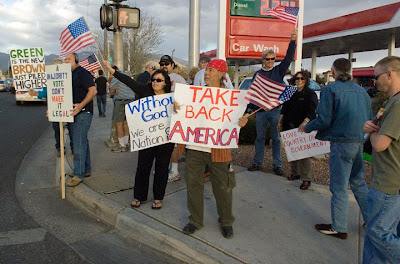 It was tax day, April 15, and many signs seemed to allude to where taxes were spent. Unlike anti-war protests, where the tax spending question is often posed with sayings like, “Schools not Bombs,” these signs referenced, that at current tax rates, “Economic Stimulus” money would accrue to protestors’ children and grandchildren.
It was tax day, April 15, and many signs seemed to allude to where taxes were spent. Unlike anti-war protests, where the tax spending question is often posed with sayings like, “Schools not Bombs,” these signs referenced, that at current tax rates, “Economic Stimulus” money would accrue to protestors’ children and grandchildren.Near the end of the couple of hour rally, I met a man who had told his boss he was going to the tea party event with the possibility of being arrested.
I can’t stop laughing! The idea that a conservative goes to a rally believing they could get arrested, while those at the other end of the political spectrum go to their rallies thinking they won’t get arrested.
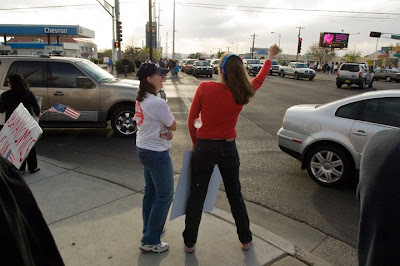 I’m not sure I can ever remember going to a right-wing rally before, that wasn’t based on the presence of a politician. It’s not their way. Why they think they make a point was left in the din of an uncoordinated effort. It was all noise – no message.
I’m not sure I can ever remember going to a right-wing rally before, that wasn’t based on the presence of a politician. It’s not their way. Why they think they make a point was left in the din of an uncoordinated effort. It was all noise – no message.There were no speeches, no catchy, “Hell No We Won’t Go.” No, it was a, make-your-own sign, bring-your-own-agenda, unless you brought one from some talk radio guy, reduced to a hastily hand written slogan on cheap poster board.
There were no leaders. There was a rabble, just no rousers.
 The media was out, sound bites were obtained, but it had the feel of a tea party, not a destroy three shiploads of tea that were subject to a tax in which those required to pay it had no say. No, these were not “Sons of Liberty,” they were more like a garden party set, where you stick your pinky finger in the air.
The media was out, sound bites were obtained, but it had the feel of a tea party, not a destroy three shiploads of tea that were subject to a tax in which those required to pay it had no say. No, these were not “Sons of Liberty,” they were more like a garden party set, where you stick your pinky finger in the air.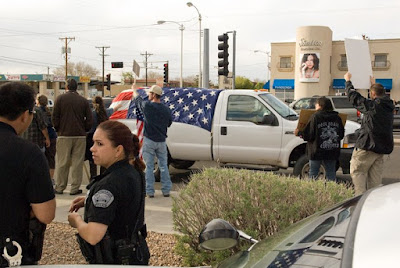 The closest to any acts of civil disobedience, I observed, were violations of the non-binding flag code and the seldom enforced, use of horn, traffic infraction.
The closest to any acts of civil disobedience, I observed, were violations of the non-binding flag code and the seldom enforced, use of horn, traffic infraction.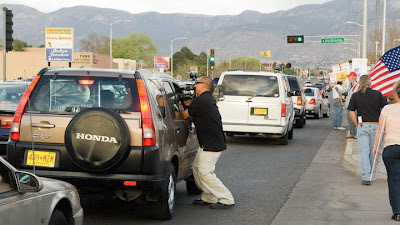 Because standing on the sidewalk wasn’t enough for some, a cruising atmosphere took hold.
Because standing on the sidewalk wasn’t enough for some, a cruising atmosphere took hold. There were some dark sides; there were no baskets of rocks, but there was at least one visual racial reference by flying the confederate flag with an upside down American flag.
There were some dark sides; there were no baskets of rocks, but there was at least one visual racial reference by flying the confederate flag with an upside down American flag.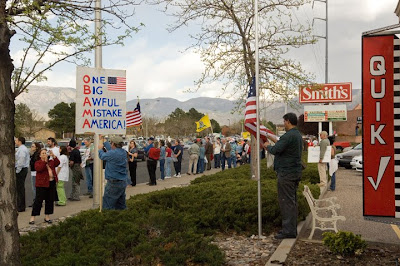 President Barack Obama, then 87 days into his administration, was the target of several signs. The protest also seemed to have an effect on business as the emissions testing shop closed after having no customers in the over crowded parking lot.
President Barack Obama, then 87 days into his administration, was the target of several signs. The protest also seemed to have an effect on business as the emissions testing shop closed after having no customers in the over crowded parking lot. A number of visual attacks were made about the current financial crisis without placing blame on those in power when it started.
A number of visual attacks were made about the current financial crisis without placing blame on those in power when it started.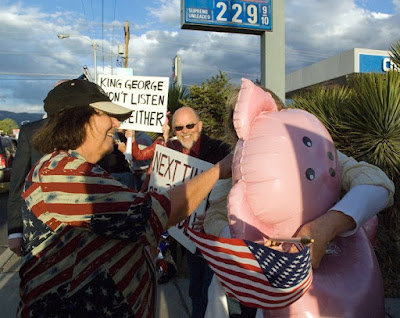 Now I didn’t expect many, if any, of these folks to attack the former administration, however, there was a disconnect with the sentiments on the street and reality.
Now I didn’t expect many, if any, of these folks to attack the former administration, however, there was a disconnect with the sentiments on the street and reality.Maybe it was just an outpouring of frustration, because the ballot box didn’t provide a satisfactory answer.
 Was this an oblique reference to George W. Bush, our third President named George?
Was this an oblique reference to George W. Bush, our third President named George?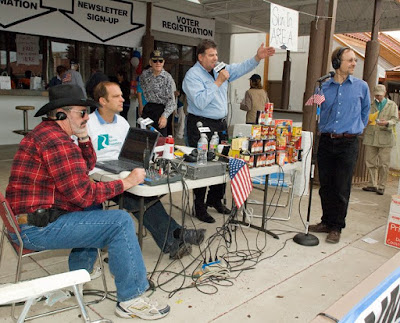 Not withstanding radio commentator Paul Gessing, second from left, who is the President of the Rio Grande Foundation and owner of Capitol Report New Mexico, for whom I provide photographs, said the economic problems belong to both parties. However, his position, along with his radio program’s co-host Jim Scarantino, right, may not have gotten to those standing on the sidewalks
Not withstanding radio commentator Paul Gessing, second from left, who is the President of the Rio Grande Foundation and owner of Capitol Report New Mexico, for whom I provide photographs, said the economic problems belong to both parties. However, his position, along with his radio program’s co-host Jim Scarantino, right, may not have gotten to those standing on the sidewalksMy blogging buddy Peter St. Cyr covered the event with audio and his own pictures.
 I’m pretty good at the metaphoric nuances, but I sure missed with this crowd.
I’m pretty good at the metaphoric nuances, but I sure missed with this crowd.There was a small contingent of police officers, which properly stood back as there was little to require any enforcement action.
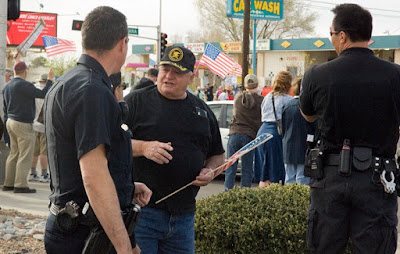 This man thanked officers for the job they were doing. I overheard another man complain to officers that a Homeland Security Police vehicle had passed on Montgomery while videoing protesters. I glanced such a vehicle later, but from a distance and could not see a camera.
This man thanked officers for the job they were doing. I overheard another man complain to officers that a Homeland Security Police vehicle had passed on Montgomery while videoing protesters. I glanced such a vehicle later, but from a distance and could not see a camera.The other thing I saw was a couple of peddlers hawking their wares in the roadway.
 At least this fellow had his safety vest on.
At least this fellow had his safety vest on.On September 21, 2001, protesters marched, starting at the University, went to Carlisle then returned to UNM. Near the end of the march when a few protestors stepped into the street, APD responded with lightening speed and harsh action, arresting several.
 The preliminary supervisor, Sgt. Mark Garcia, above left, was jostled and he lost his glasses. His first statement as to what charges were being brought was, "enticement to riot." What he may have meant was, "incitement to riot." I wrote about it in: Police Neutrality at Anti-war Protests. The majority of the cases were later dismissed.
The preliminary supervisor, Sgt. Mark Garcia, above left, was jostled and he lost his glasses. His first statement as to what charges were being brought was, "enticement to riot." What he may have meant was, "incitement to riot." I wrote about it in: Police Neutrality at Anti-war Protests. The majority of the cases were later dismissed.The point is that both sets of officers got it wrong. In 2001, the protestors, instead of being arrested, should have been protected from traffic, then encouraged to get back on the sidewalk. At Montgomery and Louisiana Boulevards, the officers should have gotten the vendors out of the street for the same safety reasons. Or, maybe they wasn't a particular safety hazard at either location.
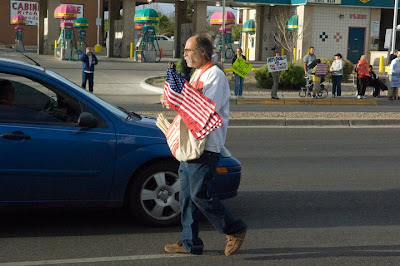 However, we don’t want American flags run over, now do we.
However, we don’t want American flags run over, now do we.
What is “Ethics Reform: What Is Happening in Albuquerque?” Tue. April 21,
 The New Mexico League of Women Voters posed the question, “Ethics Reform: What Is Happening in Albuquerque?”
The New Mexico League of Women Voters posed the question, “Ethics Reform: What Is Happening in Albuquerque?”NMLWV hosted former City of Albuquerque Attorney David Campbell, who served Mayors Martin Chávez and Jim Baca, from 1989 to 1993. His talk was about the City’s Charter Review Task Force and how suggested changes might impact the work of the group. Campbell chaired a similar task force 10 years ago.
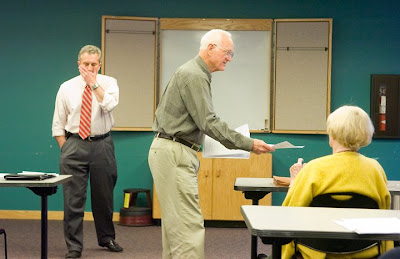 Campbell, along with former City Councillor Herb Hughes, handing out information, both sit as Council appointees on the current Task Force.
Campbell, along with former City Councillor Herb Hughes, handing out information, both sit as Council appointees on the current Task Force.My blogging buddy Ched MacQuigg, Diogenes' six, who is interested in ethics issues, was more than willing to go listen.
Unfortunately, he was extremely disappointed; “Ethics Reform” at the City doesn’t mean the same thing as MacQuigg’s definition. The City’s definition is about campaign finance reform and requiring every group, even as few as two people, to ask City permission through registration, before speaking about public issues.
MacQuigg is right, that isn’t ethics.

Let’s Ride the Elephant, Thu. April 23
 The15 member City of Albuquerque’s Charter Review Task Force appointed by City Council and the Mayor, held its last meeting with a public discussion of a controversial issue that sparked intense debate.
The15 member City of Albuquerque’s Charter Review Task Force appointed by City Council and the Mayor, held its last meeting with a public discussion of a controversial issue that sparked intense debate.The contentious issue was a proposed change to the existing Charter language, which currently reads:
Section 2. DEFINITIONS.The proposed language was:
(k) “Measure Finance Committee” means a political committee or any person or combination of two or more persons acting jointly in aid of or in opposition to the effort of anyone seeking to have their name placed on the ballot for city office, a petition to place a measure on the ballot pursuant to Article III of this Charter, voter approval or disapproval of one or more measures on the ballot and/or the election to, or recall from, office of one or more candidates for office when such person or people have accepted contributions in excess of $250 or make expenditures in excess of $250 for any of the purposes listed heretofore.
(l) “Person” means any individual, cooperative association, club, corporation, company, firm, partnership, joint venture syndicate, profit or nonprofit organization, or other entity.
"Measure Finance Committee" means any corporation, partnership, limited liability partnership, limited liability company, political committee or any person or combination of two or more persons acting jointly to distribute any communication broadcasted via internet, by television or radio, printed in a newspaper or on a billboard, directly mailed or delivered by hand to personal residences or otherwise distributed within 120 days of any municipal election.

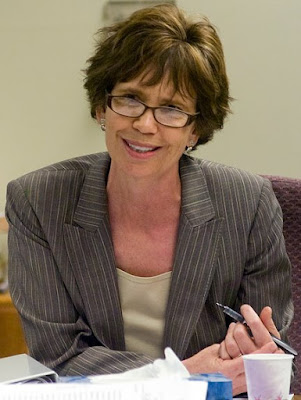 The City Council appointed former Bernalillo County District Court Judge Wendy York, above, to chair the Task Force.
The City Council appointed former Bernalillo County District Court Judge Wendy York, above, to chair the Task Force.Each of the nine Councillors appointed one task force member:
 District one, Councilor Ken Sanchez appointed Laura Horton, who is vice president of the West Side Coalition of Neighborhoods.
District one, Councilor Ken Sanchez appointed Laura Horton, who is vice president of the West Side Coalition of Neighborhoods.
District two, Councilor Debbie O’Malley appointed Michael Passi, who is a retired Associate Director of Albuquerque’s Department of Family and Community Services.
District three, Councilor Isaac Benton appointed Susan Jones, who was a former City planner for 13 years and is now a Bernalillo County planner in the public works development review department.
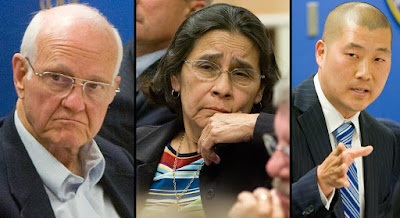 District four, Councilor Brad Winter appointed Herb Hughes, a former Albuquerque City Councilor and State Public Regulation Commission who also served on the city’s first charter review task force in 1971.
District four, Councilor Brad Winter appointed Herb Hughes, a former Albuquerque City Councilor and State Public Regulation Commission who also served on the city’s first charter review task force in 1971.
District five, Councilor Michael Cadigan appointed UNM Law Professor Gloria Valencia-Weber.
District six, Councilor Rey Garduño appointed Eli Il Yong Lee who is the Director of the Center of Civic Policy.
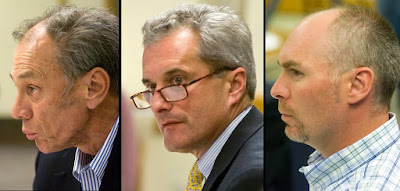 District seven, Councilor Sally Mayer appointed Chuck Gara, who is a realtor and past chairman of the National Association of Industrial and Office Properties. He served
on the City’s Environmental Planning Commission. According to his biography he, “currently is a member of the Planned Growth Strategy Implementation Advisory Task Force.” This is a direct violation of City Ordinance:
District seven, Councilor Sally Mayer appointed Chuck Gara, who is a realtor and past chairman of the National Association of Industrial and Office Properties. He served
on the City’s Environmental Planning Commission. According to his biography he, “currently is a member of the Planned Growth Strategy Implementation Advisory Task Force.” This is a direct violation of City Ordinance:Article 6: Public Boards, Commissions and Committees
§ 2-6-1-3 Membership.
The following shall govern the qualifications, appointment and conduct of members of the public boards, commissions and committees of the city;
(4) No person shall be a member of more than one public board, commission or committee at any one time.
Article 1: General ProvisionsDistrict eight, Councilor Trudy Jones appointed David Campbell, a former city attorney under the first Chávez administration. He was the chairman of the city’s charter review task force in 1998. Campbell is a member of the League of Women Voters and serves on the board of National Association of Industrial and Office Properties with fellow task force member Gara.
§ 1-1-99 General Penalty.
Any person who violates any provision of this code for which another penalty is not specifically provided shall, upon conviction, be subject to a fine not exceeding $500 or by imprisonment not exceeding 90 days or both unless a different specific penalty is provided. Each separate violation shall constitute a separate offense and, upon conviction, each day of violation shall constitute a separate offense.
District nine, Councilor Dan Harris appointed David Standridge Jr., who is a local attorney and serves on the Bernalillo County Board of Registration.
Mayor Chávez appointed five members:
 Diana Dorn-Jones is a former Assistant Chief Administrative Officer who served during the second Chávez administration. She resigned to run for the City Council seat abandoned by Eric Griego when he ran against Chávez. Dorn-Jones lost to Isaac Benton.
Diana Dorn-Jones is a former Assistant Chief Administrative Officer who served during the second Chávez administration. She resigned to run for the City Council seat abandoned by Eric Griego when he ran against Chávez. Dorn-Jones lost to Isaac Benton.Steve Gallegos is a former City Councillor and County Commissioner.
Dan Silva was an 11 term New Mexico State Representative for District 13 when appointed and a retired City government director.
Vickie Perea is a former City Councillor who retired from City government. She was the unsuccessful Republican candidate for the office of State Secretary of State.
 Marty Esquivel is an attorney, has been a City’s Red Light Camera Administrative Hearing Officer and is an elected Albuquerque Public Schools Board Member. Esquivel was not in attendance and is shown here from an APS event.
Marty Esquivel is an attorney, has been a City’s Red Light Camera Administrative Hearing Officer and is an elected Albuquerque Public Schools Board Member. Esquivel was not in attendance and is shown here from an APS event.
 City Staff at the Charter Review Task Force table included: Director of Council Services Laura Mason, Mayor’s Office Boards and Commissions, Constituent Services Coordinator Tony Pedroncelli, City Clerk Randy Autio, the Legal Department’s City Attorney Robert White and Assistant City Attorney Robert Kidd.
City Staff at the Charter Review Task Force table included: Director of Council Services Laura Mason, Mayor’s Office Boards and Commissions, Constituent Services Coordinator Tony Pedroncelli, City Clerk Randy Autio, the Legal Department’s City Attorney Robert White and Assistant City Attorney Robert Kidd. A dozen representatives of community groups spoke against the proposed changes. All claim, that as part of their greater mandate, of social good, they are educational and advocacy groups, which require organizing, lobbying and communicating with their members, contributors and each other in coalition building and engaging with similar groups in collective field strategies.
A dozen representatives of community groups spoke against the proposed changes. All claim, that as part of their greater mandate, of social good, they are educational and advocacy groups, which require organizing, lobbying and communicating with their members, contributors and each other in coalition building and engaging with similar groups in collective field strategies.The speakers insist on calling themselves “non-profits.” Though accurate, their self-description is incomplete. Non-profits come in several varieties and the lumping of them together is an attempt to keep the public from distinguishing the differences. There are taxable and tax-exempt non-profits. Taxed groups may engage in political activities, including endorsing candidates. Tax-exempt groups formed under the Internal Revenue Service Code Rule 501 (c) 3 are prohibited from becoming politically involved.
Such groups contend their education and advocacy actions neither constitute impermissible acts under the IRS code nor are they political or electioneering.
However, many don’t see it that way, especially some politicians who have been subjected to what the groups claim are simply educational efforts. Here is an example of one of the fliers.

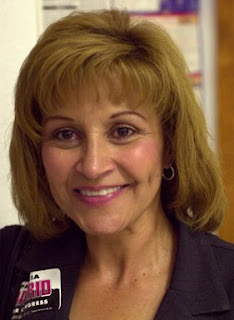 The State Attorney General Gary King, above, and Secretary of State Mary Herrera, right, have taken exception and required some groups to register.
The State Attorney General Gary King, above, and Secretary of State Mary Herrera, right, have taken exception and required some groups to register.The Lee led group of 501 (c) 3s have filed a suit in federal court trying to block the state's action.
Heath Haussamen posted the complaint. Haussamen also writes for the New Mexico Independent.
Except for the tax-exempt 501 (c) 3, most others groups, though still non-profits, are usually required to disclose their donor lists.
A particular group may be registered under IRS code with more than one classification for purposes of forwarding both their philanthropically funded social advocacy and as a political arm.
Representatives of these eleemosynary groups didn’t argue against the present City language, but attacked the changes as if they were something new and designed to specifically force them to comply.
The representatives speaking before the task force in opposition to the proposal argued that their activities as educational and advocacy groups naturally require communicating and claim that complying would not only hamper their ability to advocate but it would limit their contributions from donors who wish to remain anonymous.

 Executive Director, Community Action New Mexico’s Ona Porter, and Mary Ellen Capek, Capek & Associates, a philanthropic and nonprofit research and consulting group, former Executive Director of the National Council for Research on Women, who also serve on the Aspen Institute's Nonprofit Sector Research Fund. Executive Director of Enlace Comunitario Claudia Medina, and Amigos Bravos Michael Jensen.
Executive Director, Community Action New Mexico’s Ona Porter, and Mary Ellen Capek, Capek & Associates, a philanthropic and nonprofit research and consulting group, former Executive Director of the National Council for Research on Women, who also serve on the Aspen Institute's Nonprofit Sector Research Fund. Executive Director of Enlace Comunitario Claudia Medina, and Amigos Bravos Michael Jensen. New Mexico Coalition to End Homelessness Policy and Advocacy Director Lisa LaBrecque, American Federation of State, County and Municipal Employees (AFSCME) Council 18, Political Action Representative Carter Bundy, Sarah Berger, law firm of Freedman, Boyd, Hollander, Bergman and Ives, and Cheryl Gooding, the owner of Gooding and Associates a consulting business that works with nonprofits.
New Mexico Coalition to End Homelessness Policy and Advocacy Director Lisa LaBrecque, American Federation of State, County and Municipal Employees (AFSCME) Council 18, Political Action Representative Carter Bundy, Sarah Berger, law firm of Freedman, Boyd, Hollander, Bergman and Ives, and Cheryl Gooding, the owner of Gooding and Associates a consulting business that works with nonprofits. Sacred Alliance for Grassroots Equality, (SAGE) Council, Laurie Weahkee, Board President of SouthWest Organizing Project (SWOP) Bineshi Albert, Executive Director American Civil Liberties Union (ACLU) of New Mexico, Peter Simonson, and Director Center for Equality and Rights Rachel LaZar.
Sacred Alliance for Grassroots Equality, (SAGE) Council, Laurie Weahkee, Board President of SouthWest Organizing Project (SWOP) Bineshi Albert, Executive Director American Civil Liberties Union (ACLU) of New Mexico, Peter Simonson, and Director Center for Equality and Rights Rachel LaZar. New Mexico Chapter of the National Association of Industrial and Office Properties President Lynne Andersen, left, here in the audience with former City Councillor Nadyne Bicknell, was the sole supporter of the proposed changes, saying her organization supported getting big money out of local elections.
New Mexico Chapter of the National Association of Industrial and Office Properties President Lynne Andersen, left, here in the audience with former City Councillor Nadyne Bicknell, was the sole supporter of the proposed changes, saying her organization supported getting big money out of local elections.There were a number of spectators in the audience, including a contingent of League of Women Voters, who watched the issue and left at the discussion’s conclusion.
 Matt Brix, Policy Director of the Center for Civic Policy, lobbyist for the Center for Civic Action and former Director of Common Cause New Mexico and a current board member.
Matt Brix, Policy Director of the Center for Civic Policy, lobbyist for the Center for Civic Action and former Director of Common Cause New Mexico and a current board member.Organizing Director, Center for Civic Policy, Antoinette Tellez-Humble who also sits on the Board of Directors of New Mexico Voices for Children.
Political Director, America Votes NM, Ariel Tamara Bickel.
Communications Director at Center for Civic Action Tracy Dingmann, a former writer for the Albuquerque Journal, she also writes for the New Mexico Independent. She wrote about the meeting for Clearly New Mexico.com, the blog of the CCA.
 The task force members had a wide-ranging discussion about the proposal. The group is divisible into, what seems to be, different groups and can be classified in several ways that create differing dynamics. The following classifications are based on my best recollection. Several members can be classified into more than one sub group.
The task force members had a wide-ranging discussion about the proposal. The group is divisible into, what seems to be, different groups and can be classified in several ways that create differing dynamics. The following classifications are based on my best recollection. Several members can be classified into more than one sub group.The lawyers: York, Campbell, Valencia-Weber, Standridge, and the missing Esquivel.
Former elected City Councillors: Hughes, Gallegos and Perea.
There are five former City bureaucrats: Silva, Dorn-Jones, Campbell, Passi, and Jones.
Two have played peripheral roles in the City system: Gara, and Esquivel.
Five participants haven’t been direct City actors: York, Valencia-Weber, Standridge, Horton and Lee.
Members who have been involved with other governments, in elected, appointed positions, or through employment, include: York, Valencia-Weber, Standridge, Jones, and Esquivel.
The task force members are all political appointees and their choices reflect the underlying political views of those making the selections. If you put a political filter over this group, you find only a few, that jump out as not being Democrats: Hughes, Perea and Standridge.

Task Force member Gara brought the measured finance committee issue forward. The debate focused on the appearance that there is a disparity in how some groups engaging in political and lobbying activities are required to register and report, while others claim their organizations are exempt by virtue of their federal tax-exempt status.
 Gara held up the Albuquerque Journal with a picture of one of the mailers that were in question during the last election.
Gara held up the Albuquerque Journal with a picture of one of the mailers that were in question during the last election.Supporters of Lee’s Center for Civic Policy and Center for Civic Action and their projects perceive the City and state legislative actions as illegal attacks on them.
The lawyers got deep into this issue fast. Campbell, a member of the League of Women Voters, believes the language could halt their activities, including the widely distributed Voter’s Guide.
Valencia-Weber described the proposal as unconstitutional and thought it might make a great constitutional law case study for her UNM class. Standridge said he normally disagreed with Lee, but on this issue he agreed.
The three former City Councillors suggested that Council already has authority to and had amended the Charter’s election code.
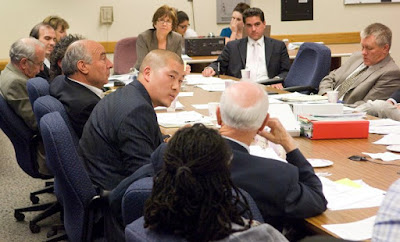 Lee said he had never been called an “Elephant in the room before,” alluding to Judge Geraldine Rivera’s comments in a recent case that the City’s administration engaged in politics for personal benefit. He was suggesting that the purpose of the proposal was to eliminate the efforts of his and similar organizations from engaging in their education and advocacy efforts.
Lee said he had never been called an “Elephant in the room before,” alluding to Judge Geraldine Rivera’s comments in a recent case that the City’s administration engaged in politics for personal benefit. He was suggesting that the purpose of the proposal was to eliminate the efforts of his and similar organizations from engaging in their education and advocacy efforts.Lee, center, was sitting next to Silva, to the left, who along with State Senators James Taylor and Shannon Robinson had sued over Lee and associated 501 (c) 3s efforts that successfully defeated them in last years election. The suit was dismissed on a motion of Lee and his fellow defendants.
Lee was upset that the issue might not be resolved quickly and could be subject to the debate of elected politicians. He said that if the measured finance question went back to the council, then he also wanted the independence of certain charter established mayoral appointed positions, specifically the city attorney, to be reviewed also.
It appears that Lee does not understand the power vested to him, in his role as a task force member. He has a right to file a minority report, on any issue, where he disagrees with the majority. He may not only file a minority report, but to talk before the council about the issues of concern. It’s rare for task force or committee members to file minority reports, but if one truly believes in their position, it is appropriate. Jones voiced a similar concern.
 Contrary to New Mexico Independent's Trip Jenning's report, the vote was 9-4. Voting for were, clockwise above: Campbell Valencia-Weber, Dorn-Jones, Hughes, Silva, Perea, and Horton in the background.
Contrary to New Mexico Independent's Trip Jenning's report, the vote was 9-4. Voting for were, clockwise above: Campbell Valencia-Weber, Dorn-Jones, Hughes, Silva, Perea, and Horton in the background.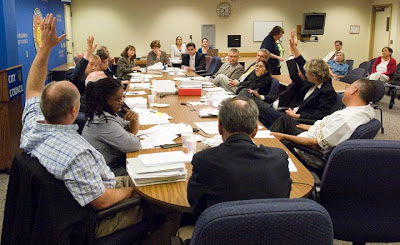 Voting against were: Passi, Jones, Standridge, and Lee, with York abstaining and Esquivel, absent.
Voting against were: Passi, Jones, Standridge, and Lee, with York abstaining and Esquivel, absent.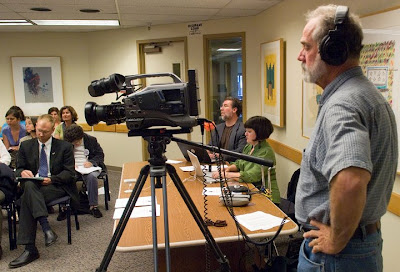 There was a media presence consisting of Albuquerque Journal Staff Writer Dan McKay, the 501 (c) 3 funded New Mexico Independent's Senior Writer Trip Jennings, at the end of the table, Reporter/blogger Gwyneth Doland, middle of the table, MacQuigg, right, and myself. We provided a video feed to NMI for live webcasting.
There was a media presence consisting of Albuquerque Journal Staff Writer Dan McKay, the 501 (c) 3 funded New Mexico Independent's Senior Writer Trip Jennings, at the end of the table, Reporter/blogger Gwyneth Doland, middle of the table, MacQuigg, right, and myself. We provided a video feed to NMI for live webcasting.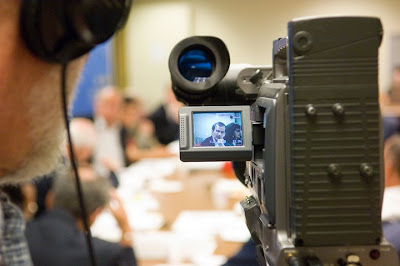 The feed failed at NMI's end and Doland used her small webcam and our audio feed. MacQuigg, and I are not compensated for providing video.
The feed failed at NMI's end and Doland used her small webcam and our audio feed. MacQuigg, and I are not compensated for providing video.This meeting might have been broadcast over government cable access channel GOV 16 had it not been in conflict with a City Council meeting.
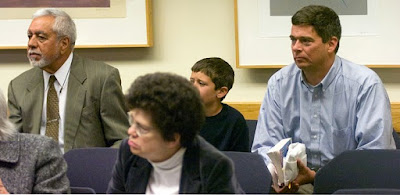 Councillors Rey Garduño and Michael Cadigan, who, as candidates, were clients of Soltari, Lee’s former business, a political consulting firm. They sat in on the close of the meeting, after attending an earlier City Council meeting. Garduño was also present before he attended the Council meeting.
Councillors Rey Garduño and Michael Cadigan, who, as candidates, were clients of Soltari, Lee’s former business, a political consulting firm. They sat in on the close of the meeting, after attending an earlier City Council meeting. Garduño was also present before he attended the Council meeting. My Take
My Take The APD contingent assigned to the Scalia event with no more than 800 people, in the 2,300 seat Kiva Auditorium, rated at least 15 officers, plus the federal Marshals, while fewer than that hung out at the tea party.
The APD contingent assigned to the Scalia event with no more than 800 people, in the 2,300 seat Kiva Auditorium, rated at least 15 officers, plus the federal Marshals, while fewer than that hung out at the tea party. There is nothing better in my book than a bunch of cops standing around with nothing better to do.
There is nothing better in my book than a bunch of cops standing around with nothing better to do. I have to ask, why does Scalia get to make the ground rules about who gets to cover him at a tax paid event? As one of the most powerful jurists in the world, what he says is news. How he thinks is of great interest to lawyers who arguge before him and for those who try to understand how laws and social issues work.
I have to ask, why does Scalia get to make the ground rules about who gets to cover him at a tax paid event? As one of the most powerful jurists in the world, what he says is news. How he thinks is of great interest to lawyers who arguge before him and for those who try to understand how laws and social issues work.
Why Scalia thinks there is sufficient enough interest in how he thinks, for him to write a book, "Making Your Case: The Art of Persuading Judges," with Bryan A. Garner, but not understand why that is not of public interest to be broadcast, or at least covered by radio and television. Such thinking is reason enough to be a perfect, "What’s Wrong With This Picture," question.
The UNM bookstore had a table set up outside the Kiva, selling his book and they lightened my wallet by $30. Though he didn't mention any of his books, and he wasn't available for a signing, it was just like a book event.
Excluding the radio and television media makes no sense. However, I played nice, I ask my question here. I’m sure that Scalia won’t be reading me and I won’t be forwarding this for his attention. I won’t cross swords with him; he’d slice and dice me like a veg-a-matic, but it won’t change the question, as to why he doesn’t deserve the coverage. It’s only his words and he controls them as he utters them.

 At the tea party, participants got together to express their displeasure at what they see as: out of control "wasteful spending," in paying taxes they believe are misdirected, and are going to cost several generations to pay back.
At the tea party, participants got together to express their displeasure at what they see as: out of control "wasteful spending," in paying taxes they believe are misdirected, and are going to cost several generations to pay back. The City’s Measure Finance Committee requirements for registration and reporting have been in place for years. Fifteen years ago, after the October 3, 1995, elections, where the quarter cent Public Safety and Community Policing Tax was successfully defeated, with the aid of the Albuquerque Police Officers Association, Mayor Martin Chávez interjected himself into the APOA Presidential race.
The City’s Measure Finance Committee requirements for registration and reporting have been in place for years. Fifteen years ago, after the October 3, 1995, elections, where the quarter cent Public Safety and Community Policing Tax was successfully defeated, with the aid of the Albuquerque Police Officers Association, Mayor Martin Chávez interjected himself into the APOA Presidential race. Four-term President, Officer Billy Pounders was defeated with the backing of Chávez, left, by then Sergeant Marie "SiSi" Saenz-Miller, above right. She is now retired Captain Marie "Sisi" Miranda. The City Clerks fielded a complaint that the APOA had not registered as a "Measure Finance Committee." Miranda was willing to plead guilty before the City’s Board of Ethics and Campaign Practices and was prepared to pay a $100 fine.
Four-term President, Officer Billy Pounders was defeated with the backing of Chávez, left, by then Sergeant Marie "SiSi" Saenz-Miller, above right. She is now retired Captain Marie "Sisi" Miranda. The City Clerks fielded a complaint that the APOA had not registered as a "Measure Finance Committee." Miranda was willing to plead guilty before the City’s Board of Ethics and Campaign Practices and was prepared to pay a $100 fine.Pounders and I got wind of the allegation that was made for actions occurring under his term, not Miranda’s. We attended the Board’s scheduled meeting and were initially denied entrance, but were escorted to a small over crowded conference room. When the case was called, we insisted we on being heard as the actual accused party. I spoke, it was the earlier APOA administration’s position that the "Measure Finance Committee" registration and reporting requirements, where funds were expended by the organization, when not in coordination with a candidate, were none of the City's business under the First Amendment. Our argument carried the day, no fine was assessed, but in part, because Miranda had since registered the APOA, even though there was no current measure requiring notice.
 It wasn’t the first time the APOA had taken such a position, or successfully argued against attempts to enforce the "Measure Finance Committee" registration and reporting requirements. Then APOA President Pounders, at right table with former Gov. David Cargo answered City Ethics Board questions about independent support of Cargo during the Mayor's election. It seems to me that only those who accept the premise in the Charter as valid and not in conflict with the first Amendment would agree to comply.
It wasn’t the first time the APOA had taken such a position, or successfully argued against attempts to enforce the "Measure Finance Committee" registration and reporting requirements. Then APOA President Pounders, at right table with former Gov. David Cargo answered City Ethics Board questions about independent support of Cargo during the Mayor's election. It seems to me that only those who accept the premise in the Charter as valid and not in conflict with the first Amendment would agree to comply.The suggested changes to the Charter’s Measure Finance Committees clause violates the concepts of the First Amendment. There is a second City document, the Lobbyist and Lobbyist Organization Registration and Disclosure Ordinance, which might have an affect. It probably does not apply here because the representatives were giving oral testimony to a City Board. However, in other circumstances, such representatives may be required to be registered. Speaking to Councillors or City staff away from the direct oral or written testimony probably requires the strict compliance with the ordinance.
I openly defied Council and challenged them to pursue me for refusing to register as a further violation of the First Amendment. I got the proverbial pat on the head and the aren’t you just a silly boy comment from a then City Councilor who recognized the violation, but loved the law, because it was a power to be lorded over those wanting to deal with the City.
I agree with the groups objecting that the City’s measure finance committee requirements are designed to identify people and has an chilling effect on free speech.
 It was then City Councillor Eric Griego who helped push the Lobbyist Registration and Disclosure Ordinance introduced by Councillor Miguel Gómez. "I don't think anyone can question my commitment to the First Amendment." Council Vice-President Griego stated, "This is not a free speech issue." I called it balderdash at the time of its passage; I wonder if he joins the nonprofit spokespersons that oppose it and would now also call it balderdash.
It was then City Councillor Eric Griego who helped push the Lobbyist Registration and Disclosure Ordinance introduced by Councillor Miguel Gómez. "I don't think anyone can question my commitment to the First Amendment." Council Vice-President Griego stated, "This is not a free speech issue." I called it balderdash at the time of its passage; I wonder if he joins the nonprofit spokespersons that oppose it and would now also call it balderdash.However, that is not how Lee or his colleague’s address the existing language. Before joining Lee, Brix was the executive director of Common Cause New Mexico and wrote a paper, “Albuquerque Clean Elections Campaign Final Summary Report,” in which he explains the formation of a registered measure financed committee to push the issue.
There is a perceived hypocritical aspect, as the groups applaud the reduction of campaign contributions, they still do their “education and advocacy” with unlimited and unidentified funding.
What the groups contend is educational is often couched as pointing out voting records of incumbents that “expose” them as opponents to the groups position on their issue or agenda. Such issue advocacy also attacks politicians with information that the politician accepts donations from individuals and organizations counter to their causes.
 One group, New Mexico Voices for Children, published "New Mexico Fiscal Policy Project: Citizen’s Guide to Legislative Advocacy in New Mexico" in 2008, that has a review of lobbying rules. NMVC's Executive Director is State Senator and former City Councillor Eric Griego, right, who was one of Lee's Soltari's first and repeat clients.
One group, New Mexico Voices for Children, published "New Mexico Fiscal Policy Project: Citizen’s Guide to Legislative Advocacy in New Mexico" in 2008, that has a review of lobbying rules. NMVC's Executive Director is State Senator and former City Councillor Eric Griego, right, who was one of Lee's Soltari's first and repeat clients.It is not about the politics of the organizations, it’s about their funding, more specifically the tax-exempt status of the 501 (c) 3s. The concern is that these groups and others have worked hard and successfully to create publicly finances election campaigns and during the last legislative session they have successfully passed campaign finance limits that will curtail the amount of money allowed, specifically by parties to $5,000 per candidate.
The question to be answered, by someone other than the groups is; are their activities legal educational and advocacy work permissible under the IRS code?
The answer, at the groups level, can be found, not only on the IRS website but also on the Federal Election Commission’s website
The magic language seems to be:
On the other hand, voter education or registration activities with evidence of bias that (a) would favor one candidate over another; (b) oppose a candidate in some manner; or (c) have the effect of favoring a candidate or group of candidates, will constitute prohibited participation or intervention.The size of donations to 501 (c) 3s are not limited and donors are not required to be identified.
If 501 (c) 3s can find ways to assist candidates they favor, or who might support their causes to get elected without violating the law, then traditional campaign contribution limits become meaningless.
However, if the activities of the 501 (c) 3s is definitively found to be legal, then the parties, both the Democrats and Republicans are likely to seriously form their own 501 (c) 3s to skirt around the new campaign finance limits.

 Last week, Scalia wrote an opinion on punishing broadcasters for airing a couple of words deemed offensive.
Last week, Scalia wrote an opinion on punishing broadcasters for airing a couple of words deemed offensive.Federal Communications Commission, Et Al., Petitioners v. Fox Television Stations, Inc., Et Al.Contrary to what he argued in his lecture, just a couple of weeks before, Scalia abandoned his originalist and texualist argument and adopted the living document argument; that it means what he thinks it should mean today. He adopts our own Mayor’s favorite reason to suppress things he dislikes, in a plaintive voice by asking, “what do we tell the children?” Maybe the answer Justice Scalia and Mr. Mayor, is to say that those are impolite, inappropriate and rude words. They won’t be tolerated in your presence and turn off the television set; then go read the kid a book.
Even when used as an expletive, the F-Word’s power to insult and offend derives from its sexual meaning. And the decision to look at the patent offensiveness of even isolated uses of sexual and excretory words fits with Pacifica’s context-based approach. Because the FCC’s prior safe-harbor-for-single-words approach would likely lead to more widespread use, and in light of technological advances reducing the costs of bleeping offending words, it was rational for the agency to step away from its old regime. The FCC’s decision not to impose sanctions precludes any argument that it is arbitrarily punishing parties without notice of their actions’ potential consequences.
If Scalia has no problem limiting words, though he claims that free speech was not an issue in this opinion, it’s clear that the government has the power, beyond radio communications, to have economic control of how words are used in public. The arguments made by the non-profits, and in particular the tax-exempts that local and state government is beyond the reach because of federal preemption clash as “Super Free Speech,” I’d love to know I didn’t have to pay taxes to write what I do under the guise of doing social good through education and advocacy, but I don’t.
 Final Thought
Final ThoughtMaybe Mayor Chávez is partially right, at least to the extent that it is about the children. However, it’s not what do we tell them; it’s what do they tell us?
 For all the "Free Speech" noise; this little girl’s sign got it right…
For all the "Free Speech" noise; this little girl’s sign got it right…
No comments:
Post a Comment